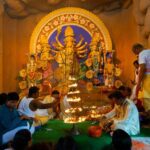Navratri, meaning “nine nights,” is one of India’s most revered festivals, symbolizing the victory of good over evil and honoring the power of the divine feminine. Celebrated twice a year, during the spring and autumn seasons, Navratri pays homage to the nine forms of Goddess Durga. This spiritual period is filled with rituals, prayers, fasting, music, and dance, providing devotees an opportunity to reconnect with their spirituality while seeking blessings for health, prosperity, and wisdom.
The Mythological Significance of Navratri
The festival of Navratri has deep roots in Indian mythology. One of the most well-known legends associated with Navratri is the battle between Goddess Durga and the demon Mahishasura. Mahishasura, blessed with near immortality, could not be defeated by any man or god. However, his boon did not protect him from the power of a woman. To end his reign of terror, the gods combined their energies to create Durga, a fierce warrior goddess. For nine days, Durga fought Mahishasura, ultimately defeating him on the tenth day, which is celebrated as Vijayadashami or Dussehra. This victory is symbolic of the destruction of evil and the restoration of righteousness.
The Nine Forms of Goddess Durga
Each day of Navratri is dedicated to one of Durga’s nine avatars, each representing a different aspect of feminine energy or Shakti. These nine forms are:
- Shailaputri – Symbolizes strength and stability.
- Brahmacharini – The goddess of penance and austerity.
- Chandraghanta – Embodies courage and bravery.
- Kushmanda – The creator of the universe, associated with joy and vitality.
- Skandamata – Represents motherhood and nurturing.
- Katyayani – A fierce warrior goddess.
- Kalaratri – Dispels darkness and fear.
- Mahagauri – Symbolizes peace and purity.
- Siddhidatri – The bestower of wisdom and spiritual knowledge.
During Navratri, devotees honor these forms through prayers, offerings, and rituals, experiencing the many facets of the divine feminine.
The Power of the Divine Feminine
What makes Navratri particularly special is its celebration of the divine feminine energy, which is intricately linked to the concept of creation. Whether it’s creating life, building a home, starting a business, or improving health, the energy of creation flows from the divine feminine. A unique remedy to harness this energy during Navratri involves using cloves. This simple yet profound practice involves holding two cloves in each hand, focusing on a heartfelt desire, and placing them at the feet of Goddess Durga during the evening aarti. With faith and patience, devotees believe that their desires will be fulfilled in divine timing.
The Spiritual Practice of Fasting
Fasting is another essential aspect of Navratri, observed by many devotees as a form of purification. Abstaining from grains, meat, and alcohol helps purify both body and mind, preparing individuals to receive the divine blessings of Goddess Durga. Fasting during Navratri is also seen as a way to deepen one’s spiritual connection, fostering self-discipline and mindfulness. This practice enhances one’s ability to focus on inner growth and cultivate spiritual awareness.
Beyond Cultural Festivities: The Inner Battle
While Navratri is celebrated with vibrant colors, music, and joy, its true significance lies in the deeper spiritual message it conveys. The festival is a reminder of the divine feminine’s presence in all aspects of creation. As devotees worship Durga, they are encouraged to conquer their own inner demons—anger, greed, pride, and jealousy—just as Durga vanquished Mahishasura. Navratri emphasizes qualities like compassion, courage, and wisdom, guiding individuals on their journey toward spiritual growth.
A Journey of Spiritual Reflection
Ultimately, Navratri is more than just a religious festival; it’s a time of spiritual reflection. It represents the eternal battle between good and evil that exists within every individual. Navratri invites devotees to celebrate the divine within, harnessing the power of the divine feminine to overcome life’s challenges and achieve inner peace and righteousness.







